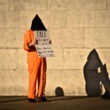Fifty-two democratic senators voted in May to confirm Harvard Law Professor David J. Barron to a seat on the First Circuit Court of Appeals (Maine, Massachusetts, New Hampshire, Puerto Rico and Rhode Island). Barron has had a distinguished career, moving back and forth between teaching and assignments with the executive branch and the Senate. He will be a progressive and competent jurist. Yet in a floor speech that was regrettably ignored or dismissed by most liberals, Republican Senator Rand Paul of Kentucky offered a compelling argument against the confirmation of Barron to the federal bench.
While on assignment with the Justice Department, Barron wrote the memos that justified the extrajudicial assassination of American citizens abroad. Those memos provided the rationale for killing Anwar al-Awlaki in a drone attack in Yemen after he was alleged to have been involved in the planning and execution of attacks against American and Western interests. After Senators insisted on seeing the memos before voting, the Obama administration allowed Senators, but not members of the House, to read selected memos. What follows is an excerpt of Senator Paul’s floor speech.—L.D.
I rise today to say that there is no legal precedent for killing American citizens not directly involved in combat and that any nominee who rubber-stamps and grants such power to a president is not worthy of being placed one step away from the Supreme Court.
It isn’t about seeing the Barron memos. It is about what they say. I believe the Barron memos disrespect the Bill of Rights.
The nomination before us, though, is about killing American citizens not engaged in combat. The nominee, David Barron, has written a defense of drone executions of American citizens not directly involved in combat.
Make no mistake, these memos don’t limit drone executions to one individual. These memos become historic precedent for killing citizens abroad.
Realize that during the Bush years, most of President Obama’s party, including President Obama himself, argued against detention of American citizens without trial. Yet now, they advocate killing American citizens without trial.
Paul: I can’t tell you what Barron wrote in the memos. The president forbids it. I can tell you what Barron did not write. He did not write or cite any legal precedent for killing an American citizen not involved in combat. Because no such precedent exists.
During President Obama’s first election, he told The Boston Globe:
“No, I reject the Bush administration’s claim that the president has plenary authority under the Constitution to detain U.S. citizens without charges as unlawful enemy combatants.”
But now as president, Obama not only signed legislation allowing detention without trial, but approved killing without trial.
I can’t tell you what Barron wrote in the memos. The president forbids it. I can tell you what Barron did not write. He did not write or cite any legal precedent for killing an American citizen not involved in combat. Because no such precedent exists.
Barron creates out of whole cloth a defense for executing American citizens without trial. The cases he cites (which I am forbidden from telling you) are unrelated to the issue of killing American citizens not engaged in combat.
This is not a secret.
No court has ever decided a case involving the extrajudicial killing of an American citizen not involved in combat.
The greatness of American jurisprudence is that everyone gets his or her day in court no matter how despicable the crime they are accused of.
Critics say, “How would we try these Americans who are overseas?”
The Constitution holds the answer. They should be tried for treason. If they refuse to return home, they should be tried in absentia and provided a legal defense.
If they are found guilty, the method of punishment is not the issue. The issue is and always has been the right to a trial, the presumption of innocence, and the guarantee of due process to everyone, no matter how heinous the crime.
How can it be anything but vigilantism? Due process can’t exist in secret. Checks and balances can’t exist in one branch of government. Whether it be upon the advice of one lawyer or 10,000 lawyers, if they all work for one man—the president—how can that be anything but a verdict outside the law—a verdict that could conceivably be subject to the emotions of prejudice and fear. A verdict that could be wrong.
Am I the only one who thinks that something so unprecedented as the assassination of American citizens should be discussed in the light of day? Am I the only one that thinks that a question of such magnitude should be decided in the open by the Supreme Court?
Lou Dubose is the editor of The Washington Spectator.





0 Comments